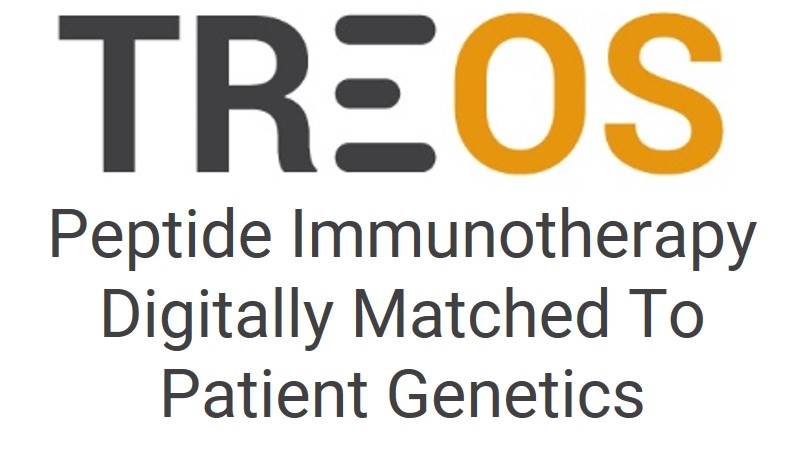LONDON, June 05, 2023 (GLOBE NEWSWIRE)– Treos Bio Limited (“Treos”), a clinical stage biotechnology company using data science and proprietary biomarkers to develop precision peptide immunotherapies, today announced the presentation of final results of the Phase 1b OBERTO-201 study of the Company’s lead product candidate, PolyPEPI1018, in combination with the oral chemotherapy TAS-102, for the treatment of patients with late-stage microsatellite stable (MSS) metastatic colorectal cancer (mCRC) at the 2023 American Society of Clinical Oncology (ASCO) Annual Meeting.
PolyPEPI1018 is an off-the-shelf, multi-peptide vaccine derived from seven tumor associated antigens frequently expressed in patients with mCRC. Final results from the study, conducted by Mayo Clinic in Minnesota, demonstrate that PolyPEPI1018 in combination with TAS-102 improved progression free-survival (PFS) and overall survival (OS) compared to historical data for standard of care TAS-102 alone.
“To our knowledge, OBERTO-201 is the first study to show promising results for an immunotherapy in combination with TAS-102 in late-stage MSS mCRC, a patient population with a poor prognosis and few available therapies, which highlights the potential clinical benefit of Treos’ multi-peptide-based vaccine for patients with mCRC in this setting,” said Dr. Christopher C. Gallen, M.D. Ph.D., Chief Executive Officer for Treos. “Importantly, these results show consistency between immunological responses and efficacy, and a particularly enhanced benefit in patients without liver metastasis. The exciting results presented today, taken together with the OBERTO-101 trial results published last year in Clinical Cancer Research, are supportive of PolyPEPI1018’s potential both in first-line maintenance stage MSS mCRC and in late stage MSS mCRC and warrant further study in larger patient populations with internal control.”
ASCO presentation highlights:
- Overall, PolyPEPI1018 vaccination successfully induced both CD8+ and CD4+ T cells in each patient with available PBMC samples (n=5) as detected by ex vivo IFN-γ /GrB FluoroSpot. The vaccine induced IgG antibody responses against 3 of the 7 target shared antigens as measured by ELISA (n=15) and IgG antibody levels increased with multiple doses.
- Patients with longer PFS (> 24 weeks) had more robust vaccine-specific immune responses, including increased number of CD8+ and CD4+ T cells, increased effector functionality, increased serum IgG antibody responses, and responded to a higher number of vaccine antigens.
- Overall mPFS was 4.0 (2.2-6.1) months. Patients with no liver metastasis (NLM) had a significantly higher mPFS of 7.6 (4.4-NE) months compared to a mPFS of 2.3 (2.1-NE) months in patients with liver metastasis (LM) (HR = 5.731 (1.213, 27.062); p=0.015).
- Overall mOS was 8.7 (6.4-NE) months. In LM patients, the mOS was 6.9 (5.1-NE) months. In NLM patients, the mOS is not yet evaluable, three out of four NLM patients currently have OS exceeding 11 months (9.7-NE) (HR = 5.97 (0.74, 47.85); p = 0.057).
The OBERTO-201 trial was funded by a grant awarded to Mayo Clinic in Minnesota (awardee) and to Treos (sub-awardee) by the U.S. Department of Defense Congressionally Directed Medical Research Program.
About Colorectal Cancer
Colorectal cancer (CRC) is the third most common cancer and cause of death in the United States and the third leading cause of cancer-related deaths worldwide. There are approximately 1.4 million people living with colorectal cancer in the United States. Current treatments for CRC include surgery and chemotherapy in early stages of disease and chemotherapy, biologics and targeted therapies in later stages. Microsatellite Stable (MSS) CRC accounts for approximately 85% of all colorectal cancers and nearly all cases of metastatic CRC. Patients with MSS CRC do not benefit from available immunotherapies.
About PolyPEPI1018
PolyPEPI1018, Treos’ lead product candidate, is an immunotherapy in clinical development for the treatment of metastatic colorectal cancer, with plans to incorporate a candidate companion diagnostic in future clinical trials. The therapy is in development as an add-on to first-line maintenance therapy and to third-line treatment. PolyPEPI1018 has been developed using Treos’ proprietary PASCal computational tool to identify Personal EPItopes (PEPIs) that are likely to induce multiple tumor-specific T Cell responses in a patient.
About Treos Bio Limited
Treos Bio develops precision peptide cancer immunotherapies using proprietary computational data science integrating HLA genetics, tumor profile and clinical outcome of thousands of real subjects. Treos’ lead candidate, PolyPEPI1018, an off-the-shelf immunotherapy for the treatment of metastatic colorectal cancer is currently in clinical development, which also investigates proprietary and novel biomarkers. Treos has completed preclinical development of additional off-the-shelf immunotherapies in ovarian, breast, bladder, gastric, lung cancers, and melanoma. The Company is also developing off-the-shelf immunotherapies personalized to an individual patient’s HLA genotype for several types of solid tumors. Treos has raised $42 million to date. More information can be found at www.treosbio.com.
Media Contact:
Solebury Trout
Zara Lockshin
+1-646-378-2960
zlockshin@soleburytrout.com
Investor Contact:
Solebury Trout
Michael Levitan
+1-646-378-2920
mlevitan@soleburytrout.com



